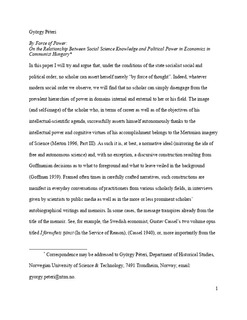| dc.contributor.author | Péteri, György | |
| dc.date.accessioned | 2020-02-26T09:17:03Z | |
| dc.date.available | 2020-02-26T09:17:03Z | |
| dc.date.created | 2019-09-26T19:36:53Z | |
| dc.date.issued | 2019 | |
| dc.identifier.citation | History of Political Economy. 2019, 51 30-51. | nb_NO |
| dc.identifier.issn | 0018-2702 | |
| dc.identifier.uri | http://hdl.handle.net/11250/2643788 | |
| dc.description.abstract | Patron-client relations were a ubiquitous feature of cultural and academic life under the state socialist social order, as were networks crisscrossing the borderlines between the domains of political power and scholarship. Awareness of and due attention to such relations and networks, this article argues, is a sine qua non of any reliable history of economics in the communist era. Pioneering projects, publications presenting innovative new approaches, individual careers yielding significant works of domestic and international acclaim were as much dependent on the support and protection of the politically powerful as on genuine talent and diligence. State socialism was not the kind of social order that would typically enable a spectacular scholarly development just “by force of thought.” The article focuses on the story of one particularly important patron in Hungary over the field of economics, a true communist grand seigneur: István Friss. It shows how his contribution has been systematically neglected, suppressed by both the historical and the memoir literature, and it presents archival evidence highlighting the vital importance of Friss’s patronage for the work and careers of such leading economists as András Bródy and, particularly, János Kornai. | nb_NO |
| dc.language.iso | eng | nb_NO |
| dc.publisher | Duke University Press | nb_NO |
| dc.title | By Force of Power: On the Relationship between Social Science Knowledge and Political Power in Economics in Communist Hungary | nb_NO |
| dc.type | Journal article | nb_NO |
| dc.type | Peer reviewed | nb_NO |
| dc.description.version | acceptedVersion | nb_NO |
| dc.source.pagenumber | 30-51 | nb_NO |
| dc.source.volume | 51 | nb_NO |
| dc.source.journal | History of Political Economy | nb_NO |
| dc.identifier.doi | https://doi.org/10.1215/00182702-7903216 | |
| dc.identifier.cristin | 1729872 | |
| dc.description.localcode | © 2019. This is the authors' accepted and refereed manuscript to the article. The final authenticated version is available online at: http://dx.doi.org/https://doi.org/10.1215/00182702-7903216 | nb_NO |
| cristin.unitcode | 194,62,65,0 | |
| cristin.unitname | Institutt for historiske studier | |
| cristin.ispublished | true | |
| cristin.fulltext | postprint | |
| cristin.qualitycode | 1 | |
